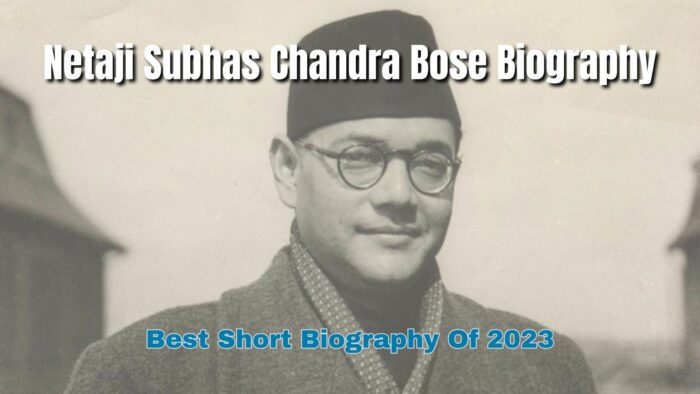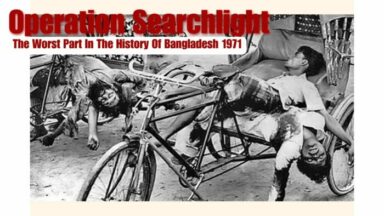
Netaji Subhas Chandra Bose Biography: Best Short Biography Of 2023
Netaji Subhas Chandra Bose biography is depicted here in a very clear voice. Netaji Subhas Chandra Bose, a legendary figure in India’s struggle for independence, continues to inspire and captivate hearts even today. His remarkable life and unwavering commitment to the nation make him a compelling figure to study and admire.
Born on January 23, 1897, in Cuttack, Odisha, Netaji Subhas Chandra Bose played a pivotal role in India’s fight against British rule. Known for his charismatic leadership and fierce determination, he left an indelible mark on the pages of history.
From his early days as a student at Cambridge University to his instrumental role in organizing the Indian National Army, Bose’s life is a testament to the power of courage and resilience. Join us as we delve into the fascinating life of Netaji Subhas Chandra Bose, exploring his childhood, political journey,
and controversial disappearance. Discover the man behind the legend and gain a deeper understanding of the sacrifices made by the leaders of India’s freedom struggle. Get ready to be inspired by a true visionary who believed in the power of unity and fought relentlessly for a free and independent India.
Netaji Subhas Chandra Bose Biography
Netaji Subhas Chandra Bose was a prominent Indian nationalist leader who played a crucial role in India’s struggle for independence against British rule. He was born on January 23, 1897, in Cuttack, Odisha. Bose’s patriotic fervor led him to establish the Forward Bloc in 1939 as a faction within the Indian National Congress.
He is known for his daring escape from British captivity and his efforts to seek international support for India’s freedom. Bose’s legacy continues to inspire generations of Indians.
Who was Netaji Subhas Chandra Bose?
Netaji Subhas Chandra Bose was an Indian nationalist leader who played a crucial role in India’s struggle for independence against British rule. Born on January 23, 1897, in Cuttack, Odisha, Bose grew up to become one of the most prominent leaders of the Indian National Congress.
He was known for his strong determination, fiery speeches, and unwavering commitment to the cause of freedom. Bose believed in the use of forceful methods to achieve independence and was a strong advocate for armed struggle against the British. He formed the Forward Bloc, a political organization, in 1939,
with the aim of achieving a united front against British imperialism. Bose’s charismatic leadership and his willingness to take risks made him a popular figure among the masses, earning him the title of “Netaji” (meaning “Respected Leader”). Despite his untimely death in 1945,
Netaji Subhas Chandra Bose remains a revered figure in India’s struggle for independence.
What were Netaji Subhas Chandra Bose’s early life and education like?
When depicting Netaji Subhas Chandra Bose biography; his childhood and early life are some of the most important aspects. Netaji Subhas Chandra Bose was born into a middle-class Bengali family in Cuttack, Odisha.
His father, Janakinath Bose, was a lawyer, and his mother, Prabhavati Devi, was a devout housewife. Bose displayed exceptional intelligence from a young age and was a diligent student. After completing his early education in Cuttack, he went on to study at the prestigious Presidency College in Kolkata.
Bose was deeply influenced by the teachings of Swami Vivekananda and was particularly drawn to his philosophy of selfless service to the nation. Inspired by this, Bose decided to dedicate his life to the cause of India’s independence.
He later went to England to prepare for the Indian Civil Service (ICS) examination but was disillusioned by the racial discrimination he faced there. This experience further fueled Bose’s determination to fight for India’s freedom and led him to join the Indian National Congress.
What were Netaji Subhas Chandra Bose’s contributions to the Indian independence movement?
Netaji Subhas Chandra Bose played a pivotal role in India’s struggle for independence. He was a prominent leader of the Indian National Congress and served as its president for two consecutive terms. However, Bose became disillusioned with the non-violent approach advocated by Mahatma Gandhi and embarked on a more radical path.
One of his most significant contributions was the formation of the Indian National Army (INA) in 1942. Bose sought support from the Axis powers during World War II to aid his fight against British imperialism. Under his leadership, the INA launched a military campaign against the British in Southeast Asia.
Though the INA’s campaign did not ultimately succeed, it played a crucial role in exposing the vulnerabilities of the British Empire and inspiring Indians to continue their fight for freedom.
What was Netaji Subhas Chandra Bose’s role in international politics?
Netaji Subhas Chandra Bose was not only a prominent figure in India but also made a significant impact on the international stage. He sought support from various nations to further the cause of Indian independence. Bose visited Germany and formed alliances with the Axis powers,
including Nazi Germany and Imperial Japan, during World War II. He established the Azad Hind Radio to broadcast messages of freedom and inspire Indians to join the struggle against British rule. Bose also established the Provisional Government of Free India in Singapore,
with the aim of gaining international recognition and support for the Indian independence movement. His efforts to seek international support for India’s independence demonstrated his strategic thinking and determination to achieve freedom for his country.
What were Netaji Subhas Chandra Bose’s views on socialism and secularism?
Netaji Subhas Chandra Bose strongly believed in the principles of socialism and secularism. He advocated for a society where economic resources would be distributed equitably and everyone would have access to basic necessities.
Bose believed that only through socialism could India achieve true independence and uplift the masses from poverty. In terms of secularism, Bose firmly believed in a united India, free from religious divisions. He emphasized the importance of unity among different religious communities and worked towards bridging the gaps between them.
Bose’s vision of a secular and socialist India continues to inspire generations to work towards a just and inclusive society.
What were the major events in Netaji Subhas Chandra Bose’s life?
Netaji Subhas Chandra Bose’s life was filled with numerous significant events that shaped the course of India’s independence movement. Some of the major events include his election as the president of the Indian National Congress in 1938 and 1939, his subsequent resignation from the party,
and the formation of the Forward Bloc. Another major event was Bose’s escape from house arrest in India in 1941, followed by his journey to Germany and subsequent alliance with the Axis powers.
Bose’s establishment of the Azad Hind Radio and the Provisional Government of Free India in Singapore were also significant milestones in his life. Finally, his untimely death in a plane crash in 1945 remains a subject of controversy and intrigue.
What were the ideologies and beliefs of Netaji Subhas Chandra Bose?
Netaji Subhas Chandra Bose was a multifaceted leader with a range of ideologies and beliefs. He firmly believed in the principles of nationalism, socialism, and secularism. Bose was a staunch nationalist who believed in the absolute freedom and independence of India from British rule.
He was also strongly influenced by the teachings of Swami Vivekananda and believed in the power of selflessness and service to society. Bose’s socialist beliefs were rooted in his desire to uplift the masses from poverty and ensure equitable distribution of resources.
Additionally, his commitment to secularism aimed to foster unity and harmony among different religious communities in India.
What were Netaji Subhas Chandra Bose’s relationships with other Indian leaders?
Netaji Subhas Chandra Bose had complex relationships with other Indian leaders during the independence movement. While he shared a close bond with some, he faced differences and disagreements with others. Bose had a strong relationship with Jawaharlal Nehru,
who later became India’s first Prime Minister. Nehru admired Bose’s leadership qualities and dedication to the cause of independence. However, Bose had a strained relationship with Mahatma Gandhi due to their differing ideologies and approaches to achieving independence.
Despite these differences, Bose’s contributions to the freedom struggle continue to be acknowledged and respected by leaders across the political spectrum.
What was Netaji Subhas Chandra Bose’s role in the Indian National Congress?
Netaji Subhas Chandra Bose played a significant role in the Indian National Congress (INC). He was elected as the president of the party in 1938 and again in 1939. During his tenure, he advocated for a more aggressive approach in the fight against British rule.
However, Bose became disillusioned with the party’s non-violent approach and resigned from his position in 1939. He later formed the Forward Bloc, a political organization aimed at mobilizing support for a united front against British imperialism.
Though he had differences with the party leadership, Bose’s contributions to the Indian National Congress and the broader independence movement are widely recognized and appreciated.
What was the significance of Netaji Subhas Chandra Bose’s slogan, “Give me blood, and I shall give you freedom”?
Netaji Subhas Chandra Bose’s slogan, “Give me blood, and I shall give you freedom,” encapsulated his unwavering commitment to the cause of Indian independence. It reflected his belief that freedom from British rule could only be achieved through sacrifice and a willingness to fight for one’s rights.
Bose’s slogan served as a call to action, urging the masses to rise up against the oppressors and join the struggle for freedom. It inspired countless Indians to join the Indian National Army (INA) and fight for their motherland.
The slogan continues to be remembered as a powerful rallying cry for independence and a testament to Bose’s leadership and determination.
What was Netaji Subhas Chandra Bose’s role in the Quit India Movement?
Netaji Subhas Chandra Bose played a crucial role in the Quit India Movement, which was a mass civil disobedience movement launched by the Indian National Congress in 1942. While Bose was initially arrested by the British authorities, he managed to escape from house arrest and make his way to Germany.
From there, he sought support from the Axis powers to aid his fight against British imperialism. Bose formed the Free India Center in Berlin and established the Azad Hind Radio to broadcast messages of freedom and inspire Indians to join the struggle.
Although Bose was not physically present in India during the Quit India Movement, his contributions from abroad played a significant role in keeping the spirit of resistance alive.
What was the significance of Netaji Subhas Chandra Bose’s alliance with the Axis powers?
Netaji Subhas Chandra Bose’s alliance with the Axis powers, including Nazi Germany and Imperial Japan, during World War II was a controversial decision. Bose sought their support to aid his fight against British imperialism and achieve India’s independence.
The significance of this alliance lies in Bose’s strategic thinking. He believed that by aligning with the Axis powers, he could weaken the British Empire’s hold on India. Though his alliance did not bring about the desired outcome,
it highlighted the international nature of India’s struggle for freedom and exposed the vulnerabilities of the colonial powers. Bose’s decision to seek support from the Axis powers remains a subject of debate and continues to shape discussions about his legacy.
What was Netaji Subhas Chandra Bose’s vision for a free India?
Netaji Subhas Chandra Bose had a clear vision for a free India. He envisioned an India that was independent, united, and free from poverty and religious divisions. Bose’s vision for a free India was rooted in his belief in social justice, equality, and the empowerment of the masses.
He emphasized the importance of self-reliance and believed that India should be a strong and self-sufficient nation. Bose’s vision also included a focus on industrialization, education, and healthcare to uplift the living standards of the people.
His ideas and vision continue to inspire generations to work towards building a prosperous and inclusive India.
What was the impact of Netaji Subhas Chandra Bose’s death?
Netaji Subhas Chandra Bose’s death in a plane crash in 1945 remains a subject of controversy and intrigue. While the circumstances surrounding his death are still debated, his demise had a significant impact on the Indian independence movement and the nation as a whole.
Bose’s death left a void in the leadership of the independence movement and led to a sense of loss among his followers. His contributions and sacrifices for the cause of freedom were widely acknowledged, and his death served as a rallying point for the continued struggle against British rule.
Bose’s legacy continues to inspire and his death remains an important chapter in India’s fight for independence.
What awards and honors have been bestowed upon Netaji Subhas Chandra Bose?
Netaji Subhas Chandra Bose has been posthumously honored with several awards and accolades in recognition of his contributions to the Indian independence movement. The Government of India conferred him with the Bharat Ratna, the country’s highest civilian award, in 1992.
Bose is also remembered and honored through various institutions, monuments, and memorials across India. The National Netaji Subhas Chandra Bose Museum in Kolkata, the Netaji Subhas Chandra Bose International Airport in Kolkata,
and the Netaji Subhas Chandra Bose Medical College in Madhya Pradesh are some examples of the tributes paid to him. Additionally, his birthday, January 23, is celebrated as “Parakram Diwas” (Valour Day) in India to commemorate his indomitable spirit and courage.
What is the controversy surrounding Netaji Subhas Chandra Bose’s death?
Netaji Subhas Chandra Bose’s death in a plane crash in 1945 remains a subject of controversy and intrigue. Various theories and conspiracy theories have emerged over the years, questioning the official version of his death. Some theories suggest that Bose did not die in the plane crash and instead lived in hiding under a different identity.
These theories are fueled by the lack of concrete evidence and conflicting accounts surrounding his death. The controversy surrounding Bose’s death continues to spark debates and investigations, with many demanding a thorough examination of the available evidence to uncover the truth.
What is the legacy of Netaji Subhas Chandra Bose?
The legacy of Netaji Subhas Chandra Bose is that of a fearless leader and a freedom fighter who dedicated his life to the cause of Indian independence. His vision of a united and independent India, free from poverty and religious divisions, continues to inspire generations.
Bose’s contributions to the Indian National Congress, the formation of the Indian National Army (INA), and his alliances with the Axis powers during World War II are significant chapters in India’s struggle for freedom. His unwavering commitment, determination,
and sacrifice serves as a reminder of the indomitable spirit of the Indian people in their pursuit of liberty and justice.
What is the importance of Netaji Subhas Chandra Bose in Indian history?
Netaji Subhas Chandra Bose holds immense importance in Indian history as one of the key figures in the country’s struggle for independence. His leadership, determination, and revolutionary ideas continue to inspire generations of Indians.
Bose’s contributions to the Indian National Congress, the formation of the Indian National Army (INA), and his alliances with the Axis powers during World War II demonstrate his strategic thinking and his unwavering commitment to the cause of Indian independence.
His legacy serves as a reminder of the sacrifices made by countless freedom fighters and the resilience of the Indian people in their quest for freedom.
What is the Netaji Subhas Chandra Bose International Airport?
The Netaji Subhas Chandra Bose International Airport is an international airport located in Kolkata, India. It serves as the primary gateway to the eastern region of the country and is named in honor of Netaji Subhas Chandra Bose.
The airport is one of the busiest in India and handles a significant amount of domestic and international air traffic. It serves as a major hub for various airlines and plays a crucial role in connecting Kolkata with other cities in India and around the world.
The airport’s name pays homage to the contributions and legacy of Netaji Subhas Chandra Bose in India’s struggle for independence.
What is the significance of Netaji Subhas Chandra Bose’s birth anniversary?
The birth anniversary of Netaji Subhas Chandra Bose, celebrated on January 23, holds great significance for the Indian people. It is observed as “Parakram Diwas” (Valour Day) in India to commemorate Bose’s indomitable spirit, courage, and contributions to the nation.
The day is marked by various events and ceremonies that celebrate Bose’s life and legacy. It serves as a reminder of the sacrifices made by countless freedom fighters and the ongoing struggle for justice, equality, and independence.
The birth anniversary of Netaji Subhas Chandra Bose is an occasion for the nation to reflect on its journey and to honor those who fought for its freedom. In conclusion, Netaji Subhas Chandra Bose was a remarkable figure in India’s fight for independence. His unwavering determination,
leadership skills, and unwavering commitment to the cause inspired millions of Indians to join the struggle for freedom. Despite facing numerous challenges and setbacks, Bose remained undeterred and worked tirelessly to achieve his goal of liberating India from British rule.
Bose’s contributions to the Indian National Congress and his role in establishing the Forward Bloc demonstrated his ability to mobilize and unite people from diverse backgrounds for a common cause. His famous slogan, “Give me blood, and I will give you freedom,” encapsulated his fearless spirit and his willingness to sacrifice everything for the sake of his country.
Even though his life was tragically cut short, Bose’s legacy lives on. His indomitable spirit continues to inspire generations of Indians to strive for independence, justice, and equality. The impact of his contributions to the freedom struggle cannot be overstated, and his name will forever be etched in the annals of Indian history.
In conclusion, Netaji Subhas Chandra Bose’s biography serves as a powerful reminder of the courage and determination needed to fight for a just and free society. His life story is a testament to the power of individuals to bring about change and inspire others to join in the struggle.
Bose’s unwavering commitment to the cause of Indian independence continues to inspire and motivate people around the world to fight for their rights and freedoms. His legacy will forever be remembered as a shining example of courage, leadership, and sacrifice.
Related Posts

50 Best Bengali Short Story Books
Are you a fan of short stories? Look no further! In this article, we h...

50 Best Bengali History Books
In this article, we will present a curated list of the 50 best Bengali...

Why Did Bangladesh Separate From Pakistan: The Best Tailored Discussion 2023
Why Did Bangladesh Separate From Pakistan is a significant event in th...

Operation Searchlight: The Worst Part In The History Of Bangladesh 1971
Operation Searchlight, a military crackdown launched by the Pakistani ...
Write your thoughts in our old fashioned Comment
EBook Comment/Review Policy. We strongly recommend leaving comments, however comments with abusive words, bullying, personal attacks of any type will be moderated.
Review Netaji Subhas Chandra Bose Biography: Best Short Biography Of 2023.